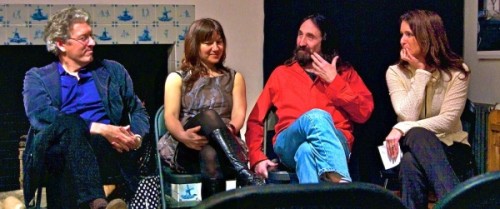 John Guidry, who writes the blog The Truth and Rocket Science (and does other important things in the non-Internet world) curated last months Brooklyn Reading Works, The Truth and the Ghost Writer. Pictured above are (left to right) James Braly, Sarah Deming, Keith Greenberg and Alisa Bowman. All are authors in the own name and ghost writers.
John Guidry, who writes the blog The Truth and Rocket Science (and does other important things in the non-Internet world) curated last months Brooklyn Reading Works, The Truth and the Ghost Writer. Pictured above are (left to right) James Braly, Sarah Deming, Keith Greenberg and Alisa Bowman. All are authors in the own name and ghost writers.
On his blog are words and pictures about this wonderful event. I quote him below. From there you should link to his blog and read the rest.
Words are everywhere.
They surround us very much like the air we breathe. Sometimes they are visible, in bookstores, in grocery stores, or on bill boards. Sometimes they are invisible: you see the leather seats, but not the word luxury. Words are many things, even as they represent many other things. Words change lives. They make you stop, push, pull, sit, wait, and be quiet. Words can kill as easily as they create.
As children, we learn magical words – abracadabras and shazams and opensesames. As adults, we learn that all words can be magical in one way or another, whether manifest, latent, silent, or spoken. Some of us fall under words’ spell. We become writers.
In this world of words, there are no strays. For all the words in the world, we can make a few observations:
Somebody wrote the words.
Somebody will be paid for them.
Somebody will claim to be their author.These statements hold true for all the words we can see in the world. The exception is for private words: the letters, personal journals, notes or emails that people write to specific somebodies or to no one at all. Under closer scrutiny, however, this exception falls away, for private words tend to become public when the opportunity cost of maintaining their privacy exceeds the actual cost of making them public. Or put differently, when the public value of private words exceeds their private value, it’s only a matter of time before they become public. Paid or unpaid, words have value, and those who claim authorship will hold that value dear, whether money is on the table or not.
The interesting thing about the above referenced somebodies is that they are not always the same somebody. Any stroll past the bestseller shelves in a bookstore (or surfed across the pages of Amazon.com) reveals a fundamental division of labor between writing and authorship, and the authors are always paid more than the writers. Additionally, agents, editors, marketers, and publishers also share in the take from any well-written (or at least well-selling) set of words. Just how the writers fit into this is an open question, because our society’s fetish for authorship is indeed a pretty solid hedge marking the boundary between our enacted reality and the real labor that makes it possible.
